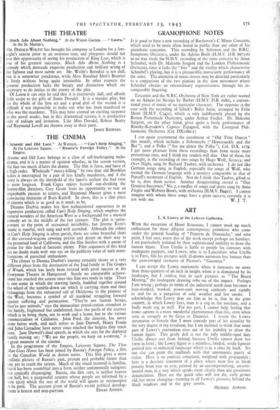THE CINEMA
Arsenic and Old Lace." At Warners. "Can't Help Singing," At the Leicester Square.—" Russia's Foreign Policy." At the Empire.
Arsenic and Old Lace belongs to a class of self-burlesquing melo- drama, and it is a matter of opinion whether, in the screen version, the fun too much dilutes the drama. The fihn is farce, and farce of a high order. Wholesale " mercy-killing " by two dear old Brooklyn ladies is interrupted by a pair of less kindly murderers and if the story is always on the threshold of the lunatic asylum the bad taste is soon forgiven. Frank Capra enjoys himself out-shocking the horror-film directors, Cary Grant loses no opportunity -to tear an improbable passion to tatters, and Raymond Massey giv.es a most convincing imitation of Boris Karloff. In short, this is a slim piece of cinema which is as good as it needs to be. Deanna Durbin makes her first technicolored appearance in an expensive production called Can't Help Singing, which employs the natural wonders of the American West as a background for a musical comedy -set in the middle of the last century. The plot is unim- portant to the point of occasional invisibility, but Jerome Kern's music is tuneful, well sung and well recorded. Although the colour in Can't Help Singing is often garish, there are some beautiful shots of the covered-wagons crossing prairie and desert on their way to the promised land of California, and the film finishes with a paean of praise for this land of fantastic plenty. Film sequences of this kind are no doubt made with one eye on the publicity value of sal mani- festations of parochial enthusiasm. The climax to Deanna Durbin's journey certainly shows us a very different place from the destination of the Joad family in The Grapes of Wrath, which has lately been revived with great success at the Everyman Theatre in Hampstead. Surely no comparable achieve- ment has reached the screen since this film was made in 1939. There is one scene in which the starving family, huddled together around the wheel of the tumble-down car which is carrying them and their belongings from the exhausted soil of Oklahoma to the promise of the West, becomes a symbol of all mankind struggling forward against suffering and persecution. "They're not human beings, they're just animals," says the immaculate petrol-station attendant as the family, frightened but undefeated; faces the perils of the journey which is to bring them, not to work and a home' but to the vicious commercialism of California. John Ford, the director, has never done better work, and such actors as Jane Darwell, Henry Fonda and John Carradine have never since touched the heights they reach here. Jane Darwell's final speech, in which she says for the depleted family moving on: "We are the people, we keep on a-coming," is
great moment of the cinema.
In the programme of the Empire, Leicester Square, The Thin Man Goes Home has been joined by Russia's Foreign Policy, a film ol the Canadian World in Action series. This film gives a more :ealistic picture of Russia's past, present and probable future than any yet to reach the screen. Much of the visual material is familiar, but it has been assembled into a form neither sentimentally eulogistic nor cynically disparaging. Russia, the film says, is neither heaven nor hell, but a purposeful country whose people are informed by a new spirit which the rest of the world will ignore or misinterpret at its peril. The account given of Russia's recent political develop-


























 Previous page
Previous page